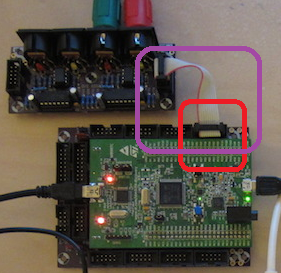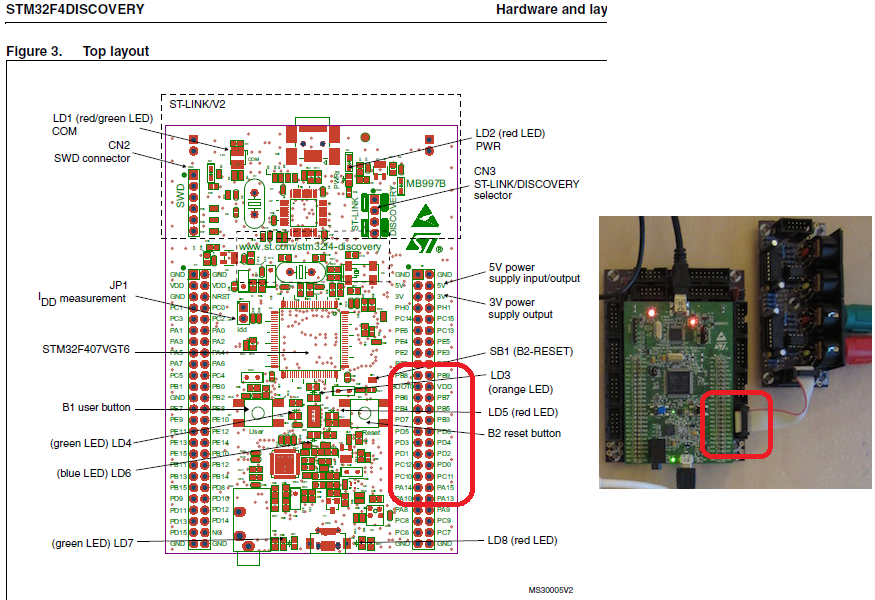-
Posts
10 -
Joined
-
Last visited
Content Type
Profiles
Forums
Blogs
Gallery
Posts posted by MS-SPO
-
-
For your wiring question: you have all the info you need in the schematics. As you choose to use a non-standard method (would be very simple with the carrier PCBs) you will have to join the dots yourself.
Hi latigid on,
I was contemplating about your answer for a while, which I percieved, without trying to be offensive, as questionable.
However, luckily the information I was looking for in fact can be found in the schematics. For the quick reader:
- connect port PA2 to connector MIDI OUTA
- connect port PD8 to connector MIDI OUTB
- include the 2 resistors of 220 ohms, each, as indicated in the MIDI_IO schematics.
For details please check:
- http://www.ucapps.de/mbhp/mbhp_core_stm32f4.pdf , J11E, pins MO1 and MO2
- http://www.ucapps.de/mbhp/mbhp_midi_io.pdf , J1 or J2, J4 (leading to OUTA), J6 (OUTB).
So non-standard wiring, as you called it, is pretty straight forward. See, simple question, simple answer, especially when the hardware is available (which I don't have) for an ohmmeter or so. As I assumed the support board, the grey connector cable and the MIDI_IO board just form a long wire with some complicated geometry .. but it remains just a wire-connection. (The LEDs and their buffers parallel to J1/J2 may or may not be used.)
So, I can save 80 % to 90 % of the "standard-components", and associated assembly time. That could be a beginning. However, I'm waiting for a reply from http://www.hobbytronics.co.uk/usb-host-mini , which could be even easier. Have to check, which reduces my overall risk ; -)
Best, Michael
-
Thank you latigie on,
yes, I saw those and was hoping for a shortcut. Example, just guessing: "connect port PD4 to pin 4 of MIDI out, and ground MIDI out pin 5, both via series res. 220 ohms". Sth. like that. Else, it's prone to errors (and I'm good in making those ;-)
Just to make sure: once this board has been set up and configured it will always run stand alone, i.e. without any further PC-connection? Connect MIDI keyboard on USB, MIDI OUT to e-drum by MIDI cable, switch it on, reset it, done. Play. Retire the PC. Is it that?
Best, Michael
Just wondering, why nobody was willing to reply to these questions, yet.
For the port-to-MIDI wiring the problem comes from the grey cable connecting both modules: which pin wires to which pin? That's not 100 % clear from looking at the board schematics. I can guess it, but I prefer to know it.
Also, my question "is it stand-alone or do I need a computer connection always" should be a no brainer for the experienced Discovery user ; -)
So, I welcome your information. Thanks + best, Michael
-
Michael,
... acts as a host, e.g.
http://www.kentonuk.com/products/items/utilities/usb-host.shtml.I'm not saying this particular one will wo...
freddy
Hello freddy,
this one seems to do the same job at a lower price: https://supr.com/mode-machines/products/cerebelusb-usb and is Adruino based (which may be beter or worse than STM, probably better).
best, Michael
-
Thank you latigie on,
yes, I saw those and was hoping for a shortcut. Example, just guessing: "connect port PD4 to pin 4 of MIDI out, and ground MIDI out pin 5, both via series res. 220 ohms". Sth. like that. Else, it's prone to errors (and I'm good in making those ;-)
Just to make sure: once this board has been set up and configured it will always run stand alone, i.e. without any further PC-connection? Connect MIDI keyboard on USB, MIDI OUT to e-drum by MIDI cable, switch it on, reset it, done. Play. Retire the PC. Is it that?
Best, Michael
-
Ok, I understand I have to install, upload, bootload some thingies to make the STM32F4-Discovery-board run .
One thing I couldn't find out: if I want to attach just one MIDI-OUT connector (supplied from my USB-keyboard attached to the STM32F4-Discovery-board), where to connect it to the board? I.e. what are the relevant pins from the Discovery board?
Thanks, Michael
-
Hi Shuriken,
no problem ;-)
-
Hi Shuriken,
thank you, the CORE_STM32F4 sounds interesting. I see I can order the STM-board from many places, like e.g. this one: http://shop.mymcu.de/index.php?sp=article.sp.php&artID=200072 .
About the lower board shown (see after "Soldering guide in http://www.ucapps.de/mbhp_core_stm32f4.html ) ... do you know if it's available as a finished product (Couldn't find it; perhaps I don't need it for my application?) ? Where to buy the MIDI-connector board http://www.ucapps.de/mbhp_midi_io.html ?
I'm enticed by the low-cost solution.
Thank you Shuriken. Best regards, Michael
-
Thanks freddy, you put my gut-feeling into words ; -)
"USB host" is certainly a good keyword to look for.
Thanks, Michael
-
Hi,
a while ago I bought a Nektar impact LX 61 keyboard, which has an USB connector only (see bottom of http://www.nektartech.com/Products/Impact-LX49 ). That worked fine (with some latency) connected to a PC and making music with a DAW.
Now I'd like to connect it directly to other MIDI devices, like my e-drum, which accepts MIDI controllers for backing parts, through regular MIDI connectors.
I'm sure there is a solution to this, but I'm not sure which one will work when searching the web. E.g. there are some USB/MIDI converters like the Prodipe MIDI USB 4i/4o (http://www.prodipe.com/en/products/interfaces/item/60-interface-midi-usb-4in/60-interface-midi-usb-4in), but USB seems to be dedicated to PC only. I'm not sure if USB/MIDI cables with integrated converter will do (e.g. http://www.thomann.de/gb/terrasoniq_midi_one.htm ).
What I'd like to have is a stand-alone solution, which converts the LX's USB connector into a regular MIDI connector, so I can plug it directly into other MIDI devices. Power supply from the solution would be nice to have over USB, as that's the LX's normal mode -
alternatively I could attach an extra power supply to the LX (right left to the USB port).[error: that's for a foot switch]I welcome your suggestions ; -)
Thanks from Germany, Michael





USB to MIDI converter?
in Miscellaneous
Posted
Dear all,
I'd like to thank you all for your support and helpful hints on my initial question: you all helped me to make up my mind.
Finally, after checking with my own hourly rate I today received my CerebelUSB unit, which works fine (plug & play-music) ; -)
Best, Michael